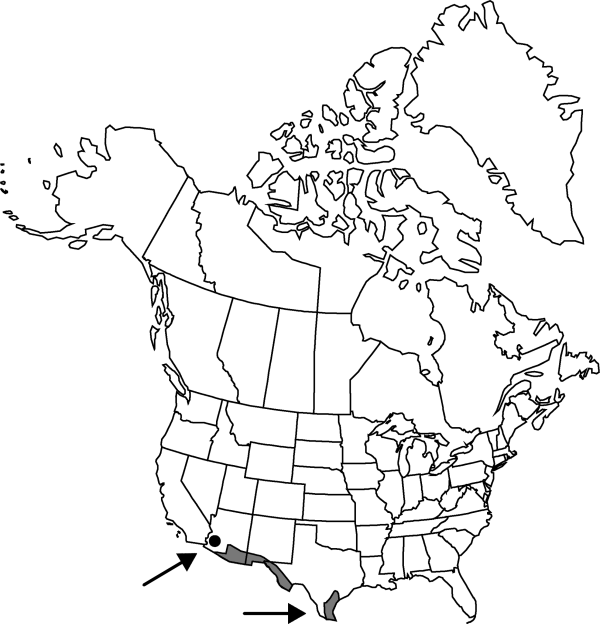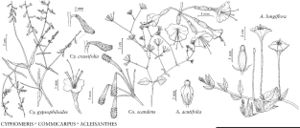Commicarpus scandens
Contr. U.S. Natl. Herb. 12: 373. 1909.
Common names: Climbing wortclub
Illustrated
Basionym: Boerhavia scandens Linnaeus Sp. Pl. 1: 3. 1753
Revision as of 08:32, 30 July 2020 by imported>Volume Importer
Stems often tangled among themselves, 3–20 dm. Leaves: petiole 3–25 mm; blade ovate, triangular, or rhombic-orbiculate, 15–60 × 10–45 mm, base obtuse, truncate, or cordate, margins shallowly sinuate, apex usually acute or acuminate, sometimes obtuse or round. Inflorescences: peduncle 4–6 cm; umbel 4–11-flowered; pedicel 3–15 mm. Perianths pale greenish yellow, 3–4 mm, glabrous or with few minute hairs externally near margin of limb. Fruits usually reflexed at tip of pedicel, 7–10 × 1.5–2 mm.
Phenology: Flowering late spring-mid fall.
Habitat: Dry, gravelly areas, often among boulders or shrubs, roadsides
Elevation: (0-)800-1800 m
Distribution

Ariz., N.Mex., Tex., Mexico, West Indies, Central America, South America
Discussion
Selected References
None.
Lower Taxa
None.
"thin" is not a number."dm" is not declared as a valid unit of measurement for this property.
... more about "Commicarpus scandens"
round;obtuse;acuminate;acute +
glutinous +
symmetric +
rhombic-orbiculate;triangular;rhombic-orbiculate;triangular;ovate +
calyxlike +
colored +
deciduous +
distinct +
herbaceous +
lanceolate +
colorful +
not showy +
large +
varying +
Climbing wortclub +
absent +
foliaceous +
scanty +
connate +
incomplete +
ribbed +
10-striate +
curved +
aerial +
reflexed +
clavate +
accessory +
coriaceous +
sticky +
1-carpellate +
few +
Present +
racemose +
axillary +
petiolate +
opposite +
equal +
sinuate +
basal +
symmetric +
yellow;pale greenish +
campanulate +
constricted +
abundant +
Contr. U.S. Natl. Herb. +
1909 +
varying +
obtuse +
tuberous +
fibrous;fleshy +
membranaceous +
connate +
wrinkled +
Illustrated +
alternate +
exserted +
varying +
unarmed +
tangled +
procumbent +
peltate +
filiform +
woody +
Commicarpus scandens +
Commicarpus +
species +
gland-tipped +
curved +
flared;5-lobed +
4-11-flowered +
perennial +
